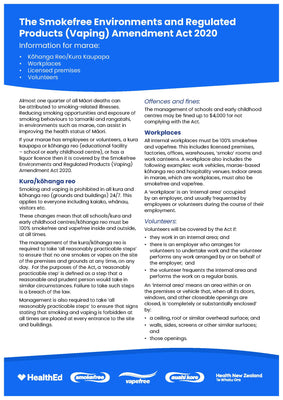Information for Marae – English - HE1719

Requirements of changes to the Smoke-free Environments Act 1990. Information about smokefree legislation that applies to marae. Includes regulations forbidding smoking of cigarettes in kōhanga reo, kura, licensed premises, and workplaces with employees and/or volunteers.
The full resource:
The Smokefree Environments and Regulated Products (Vaping) Amendment Act 2020
Information for marae covering:
Introduction
Almost one quarter of all Māori deaths can be attributed to smoking-related illness. Reducing smoking opportunities and exposure of smoking behaviours to tamariki and rangatahi, in environments such as marae, can assist in improving the health status of Māori.
If your marae has employees or volunteers, a kura kaupapa or kōhanga reo (educational facility – school or early childhood centre), or has a liquor licence then it is covered by the Smokefree Environments and Regulated Products (Vaping) Amendment Act 2020.
Kura/kōhanga reo
Smoking is prohibited in all kura and kōhanga reo (grounds and buildings) 24/7. This applies to everyone including kaiako, whānau, visitors etc.
These changes mean that all schools/kura and early childhood centres/kōhanga reo must be 100 percent smokefree and vapefree inside and outside, at all times.
The management of the kura/kōhanga reo is required to take ‘all reasonably practicable steps’ to ensure that no one smokes or vapes on the site of the premises and grounds at any time, on any day. For the purposes of the Act, a ‘reasonably practicable step’ is defined as a step that a reasonable and prudent person would take in similar circumstances. Failure to take such steps is a breach of the law.
Management is also required to take ‘all reasonably practicable steps’ to ensure that signs stating that smoking and vaping is forbidden at all times are placed at every entrance to the site and buildings.
Offences and fines:
The management of schools and early childhood centres may be fined up to $4,000 for not complying with the Act.
Workplaces
All internal workplaces must be 100% smokefree and vapefree. This includes licensed premises, factories, offices, warehouses, ‘smoko’ rooms and work canteens. A workplace also includes the following examples: work vehicles, marae-based kōhanga reo and hospitality venues. Indoor areas in marae, which are workplaces, must also be smokefree and vapefree.
A ‘workplace’ is an ‘internal area’ occupied by an employer, and usually frequented by employees or volunteers during the course of their employment.
Volunteers:
Volunteers will be covered by the Act if:
- they work in an internal area; and
- there is an employer who arranges for volunteers to undertake work and the volunteer performs any work arranged by or on behalf of the employer; and
- the volunteer frequents the internal area and performs the work on a regular basis.
An ‘internal area’ means an area within or on the premises or vehicle that, when all its doors, windows, and other closeable openings are closed, is ‘completely or substantially enclosed’ by:
- a ceiling, roof or similar overhead surface; and
- walls, sides, screens or other similar surfaces; and
- those openings.
Employers must take ‘all reasonably practicable steps’ to ensure that no person smokes or vapes at any time in an internal area of a workplace. This includes cafeterias, corridors, lifts, stairwells, toilets, workrooms and other internal areas associated with the workplace.
Examples of ‘reasonably practicable steps’ include:
- display of smokefree and vapefree signs in the workplace
- reference to the smokefree and vapefree policy in workplace employment agreements and recruitment policies
- notifying service contractors of the smokefree and vapefree policy as it applies to workplaces
- training managers and supervisors on what to do if someone smokes or vapes in the workplace.
The obligation to protect the health of staff under the smokefree law is complementary to employers’ obligations under the Health and Safety in Employment legislation, and complementary to ‘good employer’ obligations.
Where employment relationship problems arise in respect of smoking and vaping in the workplace, employers and employees should deal with these in terms of the Employment Relations Act 2000.
Offences and fines:
It is up to employers and managers to take ‘all reasonably practicable steps’ to ensure that no one smokes or vapes in the workplace. A failure to take such steps is a breach of the law under the Act and may result in a fine of up to $400 (individual) or $4,000 (body corporate).
Licensed premises
The licensee of any indoor licensed premises (liquor or gambling licence) is required to take ‘all reasonably practicable steps’ to ensure that no person smokes or vapes in an internal area on their premises. This applies to bars, restaurants, cafes, chartered clubs, sports clubs and marae with a liquor licence.
Examples of ‘reasonably practicable steps’ include:
- a set of procedures on how to deal with a patron who smokes or vapes, and associated staff training
- smokefree and vapefree signage
- removal of ashtrays.
Offences and fines:
Failure to take ‘all reasonably practicable steps’ to prevent someone from smoking or vaping in an internal area of a licensed premise may result in a maximum fine of $400 for individual licensees and $4,000 for bodies corporate.
Volunteers see above comment under ‘Workplaces’ heading.
Further information
This information is a guide only and may not be accurate for all situations. It should not be used as a substitute for legal or other expert advice.
For further information on tobacco, health and legislative requirements see:
or Contact public health services – Health New Zealand | Te Whatu Ora